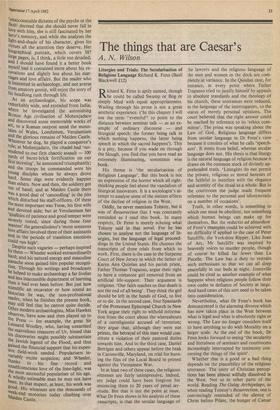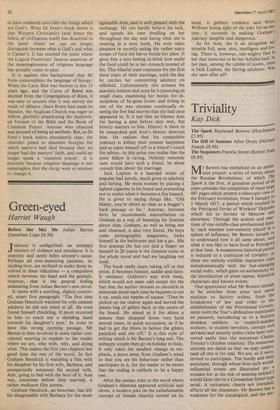The things that are Caesar's
A. N. Wilson
D ichard K. Fenn is aptly named, though IN.he could be called Swamp or Bog or simply Mud with equal appropriateness. Wading through his prose is not a great aesthetic experience. (`In this chapter I will use the term "eventful" to point to the distance between seminar talk — as an ex- ample of ordinary discourse — and liturgical speech: the former being talk in which nothing happens, the latter being speech in which the sacred happens'). This is a pity, because if you wade on through the Slough, you find that you have read an extremely illuminating, sometimes wise book.
His theme is 'the secularisation of Religious Language'. But this book is not an expression of the horror which all right- thinking people feel about the vandalism of liturgical innovators. It is a sociologist's at- tempt to analyse some of the sinister effects of the decline of religion in the West.
Oddly, he never mentions Tolstoy, but it was of Resurrection that I was constantly reminded as I read this book. In many respects, Dr Fenn is merely echoing what Tolstoy said in that novel. For he has chosen to analyse not the language of lit- urgies, but the language of legal proceed- dings in the United States. He chooses the transcripts of three trials from which to work. First, there is the case in the Surpeme. Court of New Jersey in which the father of Karen Ann Quinlan and his parish priest, Father Thomas Trapasso, argue their right to have a comatose girl removed from an artificial life-support. Their argument is religious. 'Our faith teaches us that death is not the end of all being'. They think the girl should be left in the hands of God, to live or to die. In the second case, four Spaniards of the Protestant Episcopal Church in New York argue their right to withold informa- tion from the court about the whereabouts of a correligionist accused of terrorism; they argue that, although they were not priests, the betrayal of this man would con- stitute a violation of their pastoral duties towards him. And in the third case, Daniel Berrigan and others appear before the beak in Catonsville, Maryland, on trial for burn- ing the files of the Local Board in protest against the Vietnamese War.
In at least two of these cases, the religious ,witnesses are fairly unimpressive. Indeed, my judge could have been forgiven for
>entencing them to 20 years of penal ser- vitude. But that is not the point at issue.
What Dr Fenn shows in his analysis of these :ranscripts, is that the secular language of :he lawyers and the religious language of the men and women in the dock are com- pletely at variance. In the Quinlan case, for instance, at every point where Father Trapasso tried to justify himself by appeals to absolute standards and the theology of his church, these utterances were reduced, in the language of the interrogators, to the status of merely personal opinions. The court believed that the right answer could be reached by reference to its 'ethics com- mittee'. The priest was speaking about the Law of God. Religious language differs from secular language in Dr Fenn's view because it consists of what he calls `speech- acts'. It stems from belief, whereas secular language does not. His thesis is that liturgy is the natural language of religion because it draws on the common stock of divinely ap- prehended truth. `Liturgists do not permit the private, religious or moral heresies of the faithful to interfere with the elegance and serenity of the ritual as a whole. But in the courtroom the judge made frequent reference to the personal and idiosyncratic on a number of occasions'.
Truth, in other words, is something to which one must be obedient, not something which human beings can make up for themselves. But the reductio ad absurdum of Fenn's examples could be achieved with no difficulty if applied to the case of Peter Sutcliffe, the Yorkshire Ripper. Like Joan of Arc, Mr Sutcliffe was inspired by heavenly voices to murder people, though of course he killed far fewer than La Pucelle. The Law has a duty to restrain such enthusiasts so that we can all sleep peacefully in our beds at night. Jonesville could he cited as another example of what happens when religious people follow their own codes in defiance of Society at large. And hard cases of this sort need to be taken into consideration.
Nevertheless, what Dr Fenn's book has demonstrated is the alarming divorce which has now taken place in the West between what is legal and what is absolutely right or wrong. The Law no longer considers itself to have anything to do with Morality on a larger scale. At the end of the book, Dr Fenn looks forward to seeing 'the secularity and literalness of seminars and courtrooms increasingly interrupted by testimony con- cerning the things of the spirit'.
Whether that is a good or a bad thing depends on the plausibility of the religious utterance. The unity of Christian percep- tions has been almost wilfully dissolved in the West. Not so in other parts of the world. Reading The Gulag Archipelago, as when reading Tolstoy's Resurrection, one is convincingly reminded of the silence of Christ before Pilate, the hunger of Caesar to have rendered unto him the things which are God's. What Dr Fenn's book shows is that Western Christianity (and hence the fabric of civilisation itself) has dissolved to the point where we can no longer distinguish between what is God's and what is Caesar's. It has reached the point where the Logical Positivists' fatuous assertion of the meaninglessness of religious language has actually come to pass.
It is against this background that Dr Fenn contemplates the language of liturgy. When the Latin Rite was hacked to bits 15 years ago, and the Curse of Babel was decreed from the Congregation of Rites, it was easy to assume that it was merely the result of silliness. Once Rome had made its blunder, the Anglican Church was eager to follow, gleefully abandoning the Authoris- ed Version of the Bible and the Book of Common Prayer. Anyone who objected was accused of being an aesthete. But, as Dr Fenn's book makes abundantly clear, the churches pined to abandon liturgies for which martyrs had died because they no longer had the martyrs' faith, and could no longer speak a 'common prayer'. It is precisely because religious language is not meaningless that the clergy were so anxious to change it.



































 Previous page
Previous page